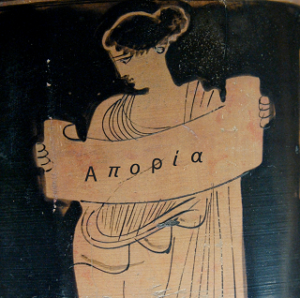
Arquivo para December 11th, 2018
Between Aporia and Aletheia
The Greek word Aporia (Ἀπορία) meant in Greek Mythology impotence, difficulty and helplessness, or even the lack of means, was rethought by the Aristotelian school as impasse, paradox, doubt, uncertainty or even contradiction, its studies are called aporetic.
or even the lack of means, was rethought by the Aristotelian school as impasse, paradox, doubt, uncertainty or even contradiction, its studies are called aporetic.
Aristotle defined it as “equality of contradictory conclusions” (Topics, 6.145.16-20).
It is important because it broke apart, albeit in a participatory way, as the logic of Being or Not Being, and there can be no contradiction, which came to be in contemporary idealism.
It is radically different from Aletheia, because it is cover-up, not contradiction and so was designated by the ancient Greeks as truth and reality, simultaneously.
Heidegger takes it back in the attempt to “unveil” the truth, it is considered an objective descriptive state, and therefore lacking a metaphysical or subjective movement.
Aporia was also used by contemporary authors, such as Derridá and Paul de Man, so in post-structuralist literary theory, is thus the very deconstructive reading of the text, which we have previously warned has nothing to do with denying the truth, but indeterminacy or undecidability .
The sense of putting them together here is precisely to seek a relationship that in contemporary theory is disconnected, being itself an aporia, the linguistic turn seems to have nothing and no connection with the ontological, so aporia and aletheia are disconnected, the Greeks little help because reading is in the past participle and not present participle.
It is curious, but it was Portugal who warned me of the fact, here is not used the gerund: someone is talking, it is saying they say, thus nothing will be, but it is being, said Priest Manuel Antunes: “mystical people, but not metaphysical” (Repensar Portugal).
While aporia is a past participle, it becomes fatalistic, undetermined as the search for truth, and aletheia while unveiling is a constant search for horizons, where there is no definitive truth, but truth in construction: being, revealing, happening.
Philosophical, political and especially religious determinism leads to various types of fundamentalism, from pure aporia to pure “truth”, there is neither dialogic nor unveiling.
Heidegger ‘s hermeneutic circle is not only a method, it is unveiling, to admit the idea that we all have a pre – concept is to unveil to the crisis of modernity, legalism and idealistic positivism gave what it gave, a no way out, but humanity itself points out ways, one already is clear: admitting that there are preconceptions is the only remedy and diagnosis capable of overcoming them.
Cultures, religions and political concepts are in shock this is aporetic, can and should enter into humanistic dialogic, ie unveiling and pursuit of horizons.

